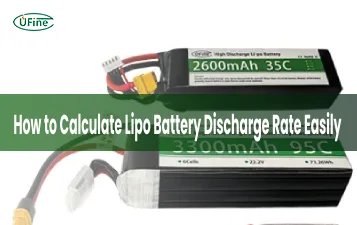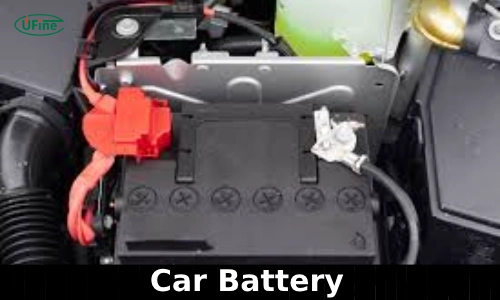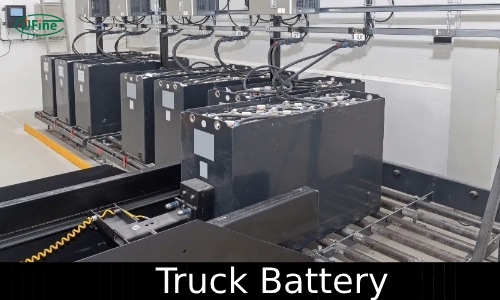Have you ever wondered how car batteries and truck batteries are different? In this article, we will explore the distinct characteristics of each type of battery. Understanding these differences is important because it helps us choose the correct battery for our vehicles. Let’s dive into the world of car and truck batteries to see what makes each unique.
Part 1. Understanding car batteries
A car battery is a vital component that provides electrical energy to start the engine and power various vehicle systems. It consists of lead-acid cells submerged in an electrolyte solution, facilitating the storage and release of electrical charge.
Key components and their functions:
- Lead plates: Provide structural support and conductive surfaces for storing and releasing electrical energy.
- Lead dioxide and sulfuric acid electrolyte: Facilitate chemical reactions necessary for energy conversion.
- Casing: Encloses and protects internal components from damage.
- Terminals: Connect to the vehicle’s electrical system for power distribution.
Types of Car Batteries
Car batteries are available in different types, each suited for specific vehicle applications based on performance requirements and environmental conditions.
Standard Lead-Acid Batteries:
- Advantages: Cost-effective, reliable starting power, suitable for most gasoline and diesel engine vehicles.
- Disadvantages: They require periodic maintenance (e.g., checking electrolyte levels) and are vulnerable to deep discharges.
AGM (Absorbent Glass Mat) Batteries:
- Advantages: Maintenance-free, spill-proof design, longer lifespan, suitable for vehicles with high electrical demands (e.g., luxury cars, modern sedans).
- Disadvantages: Higher initial cost compared to standard lead-acid batteries.
Lithium-Ion Batteries:
- Advantages: Lightweight, compact, high energy density, longer lifespan, ideal for hybrid and electric vehicles.
- Disadvantages: Expensive, sensitive to temperature extremes, requiring specialized management systems.
Part 2. Understanding truck batteries
Truck batteries are specialized energy storage units designed to meet the higher demands of commercial vehicles and trucks. They differ significantly from car batteries in construction and capacity to handle the rigorous requirements of heavy-duty applications.
Truck-specific battery requirements:
- Built to withstand frequent starts and stops, typical in truck operations.
- Must provide ample power to support additional electrical loads such as lighting, air conditioning, and onboard electronics.
- They withstand vibration and shock from rough road conditions.
Differences in construction and capacity:
- Construction: Often larger and heavier than car batteries to accommodate higher capacity and robustness.
- Plate thickness: Thicker plates can withstand deeper discharge cycles and prolonged usage.
- Internal structure: Reinforced casing and terminals to endure vibrations and prevent damage.
Types of Truck Batteries
Truck batteries come in several types, each tailored for specific operational needs and vehicle configurations.
Heavy-Duty Batteries:
- Overview: Designed for commercial trucks and vehicles with large diesel engines.
- Application scenarios: Ideal for long-haul trucks, buses, and construction equipment requiring reliable starting power and durability.
- Optimal uses: Well-suited for frequent starting and stopping cycles and extended periods of idling.
Deep-Cycle Batteries:
- Overview: Built to provide sustained power over extended periods without significant voltage drop.
- Application scenarios: Used in trucks with auxiliary equipment like refrigeration units, lift gates or hydraulic systems.
- Optimal uses: Perfect for powering accessories during prolonged stops or when the engine is off.
Dual-Purpose Batteries:
- Overview: Designed to provide reliable starting power and the capability to handle moderate auxiliary electrical loads in trucks and vehicles with mixed usage requirements.
- Application scenarios: Suitable for trucks needing robust starting power and the ability to handle accessory loads.
- Optimal uses: Commonly found in medium-duty trucks and vehicles with moderate electrical demands.
Part 3. Critical differences between car and truck batteries
When comparing car batteries to truck batteries, several critical distinctions influence their performance and suitability for different vehicle types. Understanding these differences helps select the most appropriate battery for specific vehicle needs.
1. Size and Capacity:
Car batteries are typically smaller and have lower capacity, so they are suitable for powering standard vehicle electrical systems. In contrast, truck batteries are more extensive and designed to handle higher electrical demands due to additional accessories and larger engines.
2. Power Output:
Truck batteries often feature higher Cold Cranking Amps (CCA), providing robust starting power for larger engines and frequent starts. Car batteries have lower CCA ratings suitable for smaller engines and typical driving conditions.
3. Plate Thickness and Grid Structure:
Truck batteries are constructed with thicker plates and more robust grid structures to withstand vibrations and shocks encountered in heavy-duty applications. Car batteries have thinner plates optimized for lighter usage.
4. Internal Components:
Truck batteries may include additional internal components to support heavy electrical loads and extended usage, such as reinforced terminals and casing materials. Car batteries focus on compact designs for efficient space utilization.
5. Cold Cranking Amps (CCA):
CCA ratings for truck batteries are higher to ensure reliable engine starts in cold weather conditions and intensive usage scenarios. Car batteries have lower CCA ratings that are sufficient for typical driving conditions.
6. Reserve Capacity:
Truck batteries generally have a higher reserve capacity to sustain power output for longer durations, accommodating frequent idling and auxiliary equipment. Car batteries offer sufficient reserve capacity for standard driving needs.
7. Charging Requirements:
Truck batteries may require specialized charging systems to effectively manage their larger capacities and specific charging cycles. Car batteries typically have more straightforward charging requirements.
8. Maintenance Needs:
Truck batteries require less frequent maintenance due to their robust design and higher tolerance for deep discharges. Car batteries may need periodic electrolyte checks and occasional recharging to maintain optimal performance.
Part 4. FAQs
-
Can I use a car battery in a truck?
Experts do not recommend using car batteries for trucks because they have lower capacity and cannot handle the higher electrical demands of truck engines and accessories. -
How do I know if my truck battery needs replacement?
Look for signs like difficulty starting the engine, dim headlights, or electrical malfunctions. Regular testing helps catch issues early. -
How often should I replace my truck battery?
Typically, truck batteries last 3 to 5 years, depending on usage and conditions. Replace as needed to avoid unexpected failures. -
Do truck batteries need special maintenance?
Yes, regular checks of electrolyte levels, clean terminals, and proper charging methods are crucial for optimal truck battery performance. -
What should I do if my truck battery dies?
Jump-start with cables or a portable starter. Consider testing and replacing if problems persist to avoid vehicle downtime.
Related Tags:
More Articles

LiPo Battery Discharge Rate Guide & Calculation Tips
Understand LiPo battery discharge rates, C-ratings, and how to calculate max current. Essential guide for RC, drones, and electronics users.
High‑Capacity 3S LiPo Batteries: 5000 mAh vs. 10000 mAh
Compare 3S LiPo 5000mAh vs 10000mAh batteries by weight, power, and use. Find the best fit for your drone, RC car, or boat setup.
Top 5 Applications for Small 3S LiPo Batteries
Small 3S LiPo batteries power drones, RC gear, wearables, and robotics with high energy and low weight. Making them ideal for compact electronics projects.
Building and Charging Your Own 3S LiPo Pack: A Step‑by‑Step Guide
Learn how to build, balance, and charge a 3S LiPo battery pack safely at home with this complete DIY guide for hobbyists and beginners.
How to Choose the Right LiPo Battery Plug Type?
Discover the best LiPo battery plug types, how to choose them, and expert tips for safe usage, soldering, and maintenance.





